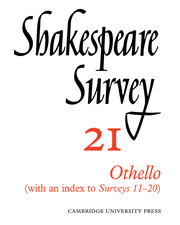Book contents
- Frontmatter
- ‘Othello’: A Retrospect, 1900–67
- The Two Parts of ‘Othello’
- ‘Othello’: A Tragedy Built on a Comic Structure
- ‘Othello’ and the Pattern of Shakespearian Tragedy
- ‘Othello’, ‘Lepanto’ and the Cyprus Wars
- Iago—Vice or Devil?
- Thomas Rymer and ‘Othello’
- Delacroix’s Tragedy of Desdemona
- Verdi’s ‘Otello’: A Shakespearian Masterpiece
- William Hervey and Shakespeare’s Sonnets
- Imagery and Irony in ‘Henry V’
- Shakespeare and the Actors: Notes towards Interpretations
- The Year's Contributions to Shakespearian Study 1 Critical Studies
- 2 Shakespeare’s Life, Times and Stage
- 3 Textual Studies
- Index to Volume 21
- General Index to Volumes 11–20
- Plate Section
Verdi’s ‘Otello’: A Shakespearian Masterpiece
Published online by Cambridge University Press: 28 March 2007
- Frontmatter
- ‘Othello’: A Retrospect, 1900–67
- The Two Parts of ‘Othello’
- ‘Othello’: A Tragedy Built on a Comic Structure
- ‘Othello’ and the Pattern of Shakespearian Tragedy
- ‘Othello’, ‘Lepanto’ and the Cyprus Wars
- Iago—Vice or Devil?
- Thomas Rymer and ‘Othello’
- Delacroix’s Tragedy of Desdemona
- Verdi’s ‘Otello’: A Shakespearian Masterpiece
- William Hervey and Shakespeare’s Sonnets
- Imagery and Irony in ‘Henry V’
- Shakespeare and the Actors: Notes towards Interpretations
- The Year's Contributions to Shakespearian Study 1 Critical Studies
- 2 Shakespeare’s Life, Times and Stage
- 3 Textual Studies
- Index to Volume 21
- General Index to Volumes 11–20
- Plate Section
Summary
Verdi’s Otello is commonly considered not only the greatest opera based on Shakespeare but one of the supreme masterpieces of the art. There is no reason to dispute this judgement. It is however interesting, and possibly instructive, to examine the premises on which it rests. How has the unique quality of the play been translated into operatic terms? What demands does Shakespeare make on the librettist and composer? How did Boito and Verdi come to succeed where so many others have failed?
Opera is a highly complex and baffling art-form, since it pulls in so many directions at once. It must reach a compromise between several means of artistic expression—music, drama, spectacle, scenic design, perhaps ballet—each with its own demands and disciplines and liable to assert its own supremacy. The balance has varied at different periods, but it is always precarious. When the opera is based on a literary masterpiece, the difficulties are multiplied. Music can illumine words, but it can easily obscure, distort or clog them; the richer their content, the more they defy musical setting (the history of music is littered with the debris of literary lilies snapped off by presumptuous gilding). This is true on the small scale of a song or cantata; in a full-length opera, apart from the sheer size of the undertaking, the odds against success are lengthened by the fact that the pace of music is not only slower than that of a spoken play; it is different in kind.
- Type
- Chapter
- Information
- Shakespeare Survey , pp. 87 - 96Publisher: Cambridge University PressPrint publication year: 1969

